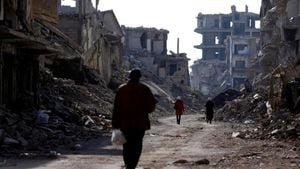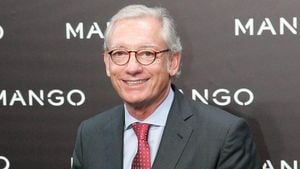DAMASCUS, Syria — Ousted Syrian President Bashar Assad has expressed his desire to have remained in Syria after rebels captured the capital, Damascus, but was evacuated by Russian military forces following attacks on their base. These comments mark Assad's first public remarks since he was overthrown by insurgent groups over the past week.
According to Assad, he left Damascus on December 8, hours after insurgents began their offensive. He stated he coordinated his departure to the Russian airbase at Hmeimim, located within the coastal province of Latakia, where he initially intended to continue his fight against the insurgents.
"I did not leave the country as part of a plan as it was reported earlier," Assad declared on his social media. Claiming he had not considered stepping down, he added, "At no point during these events did I think about seeking refuge nor was such proposal made by any individual or party. The only course of action was to continue fighting against the terrorist onslaught."
Damascus residents are expressing skepticism about Assad's narrative, with many stating he has abandoned the people long ago. One local, Moataz al-Ahmed, commented, "Is he going to run away from us? He still won’t be able to run away from God," as children treaded upon remnants of Assad's familial legacy.
The spokesman for the new transitional government has been adamant, stating, "The Assad regime is finished with no return," urging Russia to reconsider its presence and interests within Syria. Obeida Arnaout, the spokesman, stressed the importance of constructing relations with neighboring countries and the international community.
Assad's remarks followed this swift change of power, with the new leadership reportedly preparing for UN-supervised elections and promoting the need for stability. The U.S. has engaged with the group governing the insurgents, facilitating political contacts to discuss the return of American citizens previously detained during Assad's reign.
Since the upheaval, the atmosphere has shifted across Syria, with the new government working toward inclusivity and addressing the concerns around potential power vacuums left from the rebel offensive. A fighter near the Hmeimim base stated, "The Russians are preparing to withdraw from Syria, God willing," reflecting the uncertainty concerning foreign military presence.
The rapid collapse of Assad's regime followed years of civil unrest, severely crippling Syria's infrastructure and societal fabric. Reports emerged detailing Israel's intensifying airstrikes targeting military assets once held by Assad, marking the most violent actions seen since 2012.
Despite the sweeping nature of these changes, the region remains fraught with instability, and the influence of erratic groups such as Hayat Tahrir al-Sham (HTS)—identified as terrorists by several nations—continues to pose questions about future governance.
On the international front, the EU is pushing for guarantees from Syria's transitional authorities to progress toward peace. EU officials articulated their stance, stating they seek to restore stability and curb extremism without the interference of prior allies of the Assad regime.
With Assad out of power, the future of the Syrian state and its multitude of ethnic and religious groups is left uncertain. The new interim government, brought to prominence by HTS, has yet to provide clarity on how it plans to govern or deal with the complex social divisions created during years of conflict.
Overall, experts warn the fall of Assad opens both opportunities and crises for the country, as previous alliances fracture and new entities jostle for power amid the ruins of the once-structured governance led by the Assad family for decades.
More than half of Syria's population has fled due to years of violence, and many refugees, having found themselves displaced, are now questioning what path lies before them.
Assad’s comments serve as not just an update on his personal situation but also as reflections on the broader narrative of power transition within Syria—a narrative still being shaped as global leaders reassess their stance on the new realities facing the region.



